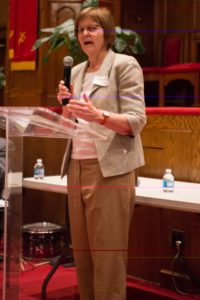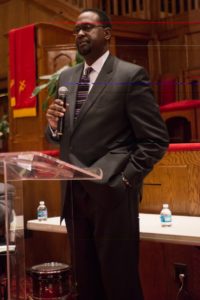Suicide occurs regularly among African-Americans but its culture historically won’t face it in a meaningful way. African-American males in particular view any mental health challenges – not only suicide – as unmanly and typically dismiss them out of hand.
But it’s high time this changes, said those leading the May 15 town forum on “Suicide and the African-American Community” at the Second Baptist Church, 1717 Benson Ave. in Evanston. Dozens of people turned out to tackle the difficult topic.
Suicide claims 38,000 Americans every year – more than die in car accidents or homicides. The National Institute of Mental Health reports 90 percent of suicides are tied to some form of mental illness.
Church Pastor Mark Dennis helps guide many church members through immediate suicide threats. When the crisis passes, he said, “I get them in touch with qualified mental health professionals who take it from there. Not all answers to our problems can be found only in the church.” Moreover, Pastor Dennis himself has used mental health counselors on occasion.
One mental health professional is Dr. Jacquelin Anderson, Ph.D., of Northeastern Illinois and Loyola universities. Her mother killed herself years ago. Dr. Anderson had always found it hard to talk about it. “However, I am telling that full story now. This is what we all must do – remove the shame and stigma surrounding suicide by talking about it openly and honestly.”
Only then, she said, can real progress begin to find ways to prevent suicide.
Evanston Mayor Elizabeth Tisdahl told the group she thought the city has all the health programs citizens require. “But when I asked an aide for a list of entities dealing with suicide, I found the answer is really painful to admit. There are none. So I have a challenge to change that for our citizens and will work hard to do that.”
Dr. Reginald Richardson, Ph.D., is Vice President for Evaluation and Clinical Services at Northwestern University’s Family Institute. He said turning the tide toward African-American awareness of suicide and meeting suicide’s challenges is an “erosion, not an explosion. It will take time, and we must persevere.”
The conference was put on by the Naomi Ruth Cohen Institute at The Chicago School of Professional Psychology. The NRCI can be reached at 312-467-2552 or nrcinstitute@thechicagoschool.edu.



